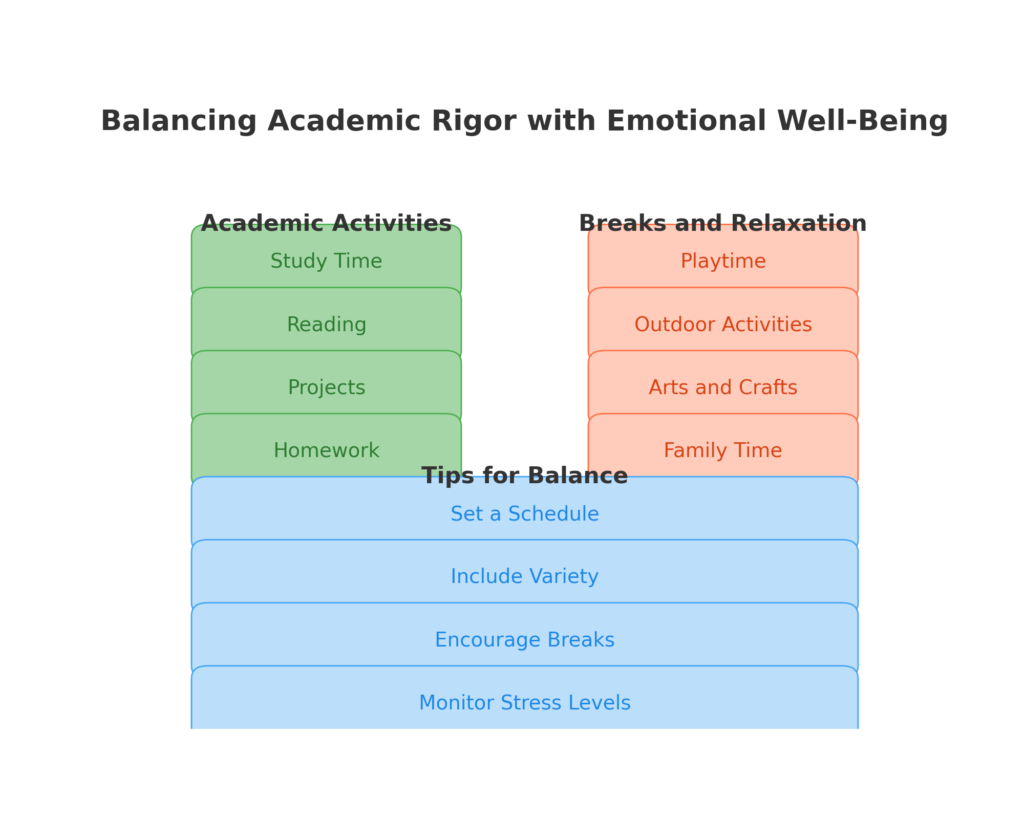The term Homeschooling is becoming more popular, particularly, after the covid pandemic. Today we will learn everything about homeschooling the gifted child. we will discuss the proven strategies, best programs and so many things.
The Benefits of Homeschooling a Gifted Child
Unlike traditional classroom settings, homeschooling allows for a level of personalization and depth that caters to the specific needs and passions of gifted learners. Here are some key benefits:
Freedom to Explore Passions Deeply
One of the most profound benefits of homeschooling a gifted child is the freedom it provides to explore their passions deeply. Your child might be fascinated by curriculum like astronomy, an interest far beyond the typical kindergarten curriculum.
Traditional schools often have to adhere to a strict curriculum, limiting the time and resources available to dive into specialized subjects. However, homeschooling allows us to visit planetariums, build a telescope, and even connect with local astronomers.
This hands-on, immersive experience can ignite her love for science in a way that no textbook ever could.
Interacting with Diverse Age Groups
Another significant advantage of homeschooling is the opportunity for gifted children to interact with a diverse range of age groups.
In a traditional school setting, children are often confined to a classroom of peers their own age.
This can be limiting, especially for gifted children who may find it difficult to connect with their age-mates on an intellectual level.
Homeschooling, on the other hand, allows children to socialize in more varied settings. They can join mixed-age co-op groups, participate in community activities, or even engage in adult-led workshops.
These experiences foster social maturity and provide a broader perspective on the world.
Self-Paced Learning
Self-paced learning is perhaps one of the most celebrated benefits of homeschooling for gifted children. Traditional classrooms often struggle to accommodate the varying speeds at which students learn.
Gifted children, in particular, can become bored and disengaged if they are not sufficiently challenged. Homeschooling solves this by allowing children to progress through subjects at their own pace.
If your child masters math concepts quickly, they can move on to more advanced topics without waiting for the rest of the class. Conversely, if they need more time to grasp a concept, they can take that time without feeling pressured to keep up with peers.
This individualized approach fosters a love of learning and ensures that no child is left behind or held back.
Tailored Curriculum
Homeschooling also offers the flexibility to tailor the curriculum to the child’s interests and strengths. For instance, if a child excels in language arts but struggles with math, their education can be adjusted to provide more challenging reading materials while offering additional support in math.
This customized approach not only plays to the child’s strengths but also addresses their weaknesses in a supportive and non-stigmatizing environment.
A Personal Reflection
Reflecting on my homeschooling journey with a relative, I realize how these benefits have shaped her development.
Her passion for astronomy has blossomed into a deep understanding of physics and a desire to pursue a career in astrophysics.
Her social skills are well-rounded, as she’s been able to interact with a wide range of people, from younger children in our homeschool group to adults in our local astronomy club.
The self-paced learning has kept her engaged and motivated, and the tailored curriculum has ensured she remains challenged and supported.
In conclusion, homeschooling a gifted child is not without its challenges, but the benefits can be profound and far-reaching.
The ability to explore passions deeply, interact with a diverse age group, and learn at one’s own pace creates an enriching educational environment that fosters growth, curiosity, and a lifelong love of learning.
If you are considering homeschooling for your gifted child, these benefits may very well tip the scales in favor of this personalized and flexible educational approach.
Challenges of Homeschooling Gifted Children
It can be an incredibly rewarding experience, but it also comes with unique challenges that can test even the most dedicated parents. As a teacher and a good neighbour, I’ve navigated these waters firsthand.
The journey is often filled with moments of wonder and discovery, yet it can also be fraught with frustrations and uncertainties. Here, I’ll share some of the most common challenges and offer insights from my personal experiences.
Balancing Academic Rigor with Emotional Well-Being
One of the first challenges you might face is striking the right balance between providing academic rigor and ensuring your child’s emotional well-being. Gifted children often have an insatiable curiosity and a desire to delve deeply into subjects that interest them.
However, this intense focus can sometimes lead to stress and burnout if not carefully managed.
I remember child, was in kindergarten. She was fascinated by astronomy and wanted to spend hours each day studying the stars and planets. While it was exhilarating to see her so passionate, I soon noticed she was becoming overwhelmed. We had to learn to set boundaries and incorporate breaks and varied activities to help her relax and recharge.
Academic Engagement: 50%
- Advanced Reading Materials
- Science Projects
- Math Challenges
Breaks and Relaxation: 25%
- Outdoor Play
- Arts and Crafts
- Mindfulness Exercises
Social Activities: 15%
- Homeschool Co-op
- Playdates
- Group Projects
Family Time: 10%
- Family Outings
- Game Nights
- Movie Time

Socialization Concerns
Another significant challenge is ensuring your gifted child has ample opportunities for socialization. Unlike their peers in traditional schools, It might miss out on regular interactions with a broad group of classmates. This lack of social engagement can sometimes lead to feelings of isolation.
In your homeschooling journey, you can join a local homeschool co-op, which can be a game-changer. Your child will get to meet other children who share their interests, and you can participate in group projects and field trips. These interactions can be crucial for her social development and wll help her build lasting friendships.
Adapting to Different Learning Styles
Gifted children often have unique learning styles that may not fit into a conventional teaching mold. They might be asynchronous learners, excelling in some areas while being at the typical grade level in others. This can make it challenging to find or create a curriculum that meets all their needs.
For example, your child can be years ahead in reading but might struggle with fine motor skills. you have to customize her learning plan to include advanced reading materials while simultaneously incorporating activities to improve her motor skills, such as crafts and hands-on science experiments.
Resource Limitations
Access to resources can also be a hurdle. Public schools often have more extensive libraries, labs, and extracurricular activities. As a homeschooling parent, you might find yourself investing in various materials or seeking out community resources to supplement your child’s education.
One resource we found invaluable was our local library. Not only did it provide a wealth of books and educational materials, but it also hosted workshops and events that enriched child’s learning experience. Additionally, online resources and virtual classes became indispensable tools, especially for subjects outside my expertise.
Read Homeschooling an Autistic Child: Tips Schedules and Strategy
Resources Comparison: Public Schools vs. Homeschooling
| Resource | Public Schools | Homeschooling |
|---|---|---|
| Libraries | Extensive on-campus libraries | Local public libraries, online resources |
| Labs | Fully-equipped science labs | Home experiments, science kits |
| Extracurriculars | Sports, clubs, arts programs | Community sports, online classes |
| Field Trips | School-organized trips | Family-planned educational outings |
| Social Interactions | Daily peer interaction | Homeschool groups, co-ops, playdates |
Managing Expectations and Perfectionism
Gifted children can sometimes be perfectionists, setting high standards for themselves and becoming frustrated when they don’t meet their own expectations. This perfectionism can lead to anxiety and a fear of failure.
A child, at just six years old, was working on a science project. She became incredibly upset when her experiment didn’t yield the expected results. It was a teachable moment for both of the parents. They learned to celebrate the process of learning, not just the outcomes, and to view mistakes as opportunities for growth.
Finding Support and Community
Lastly, finding a supportive community can make a world of difference. Homeschooling can be isolating for parents, too, and having a network of like-minded individuals can provide much-needed encouragement and advice.
You have to join several online forums and local support groups for parents of gifted children. These communities offers a treasure trove of resources, shares experiences, and emotional support that are essential in navigating the challenges of homeschooling.
Despite these challenges, homeschooling a gifted child can be incredibly fulfilling. It allows for a personalized education that caters to your child’s unique strengths and interests.
Homeschooling vs Traditional Schooling for Gifted Learners
Homeschooling Advantages
Homeschooling has emerged as a popular choice for gifted children, offering a unique educational pathway that caters to their exceptional abilities and individual needs. Here are some key benefits:
- Flexibility: Allows learners to progress at their own pace, diving deep into subjects they are passionate about.
- Safe Environment: Shields gifted children from social challenges such as bullying and peer pressure, which they might face in traditional classrooms.
Traditional Schooling Advantages
On the other hand, traditional schooling offers its own set of benefits for gifted learners:
- Structured Environment: Provides access to advanced placement (AP) courses and gifted programs.
- Social Skills Development: Enhances interpersonal skills through interaction with a diverse group of peers.
“Traditional school helped my child develop essential social skills and offered various extracurricular activities to challenge their intellect.” – A Traditional School Parent
Personal Experiences and Reflections
Reflecting on my own experiences, I can see the profound impact of both educational paths. During my homeschooling years, I reveled in the freedom to explore my interests without the constraints of a rigid curriculum. Conversely, my time in traditional school introduced me to a world of social interactions and diverse perspectives.
Homeschooling:
- Engaged in deep study of subjects like astronomy.
- Spent hours writing stories and nurturing creativity.
Traditional Schooling:
- Participated in debate teams and science fairs.
- Learned resilience and collaboration.
Concerns About Homeschooling a Gifted Child
Choosing between homeschooling and traditional schooling for gifted learners involves careful consideration of ethical and moral implications. It’s crucial to recognize that each child is unique, and what works for one may not work for another. Parents and educators must weigh the pros and cons, keeping the child’s best interests at heart.
Final Reflections on Gifted Homeschooling
Both homeschooling and traditional schooling offer valuable opportunities for gifted learners. The decision should be guided by the child’s needs, interests, and personality. Whether through the tailored approach of homeschooling or the structured environment of traditional schooling, the goal remains the same: to cultivate a love for learning and equip gifted children with the tools they need to succeed in all aspects of life.
The National Association for Gifted Children (NAGC) is a leading organization dedicated to supporting and advocating for gifted children and their educational needs.
They provide resources, professional development opportunities, and research-backed insights to parents, educators, and policymakers. Visit NAGC for more information on how they empower gifted learners and their families.
Gifted Homeschoolers Forum (GHF) also offers a network of like-minded individuals.
Should Gifted Children Be Homeschooled?
Homeschooling can be a highly effective educational option for gifted children, as it allows for a customized learning experience that can be tailored to their advanced abilities and interests.
Homeschooling provides the flexibility to
Customize Curriculum, Flexible Scheduling, Individual Attention.
Current Data:
Growth in Homeschooling: Homeschooling among gifted students has increased by 5-7% annually over the past decade.
Parental Satisfaction: A survey by the National Home Education Research Institute found that over 90% of parents of gifted homeschooled children reported high satisfaction with their child’s academic progress.

Nawab is an experienced educator with a decade of teaching across preschool to K-12 levels. Holding both a graduate degree and a diploma in elementary education, he is passionate about fostering learning environments that inspire young minds. In addition to his teaching career, Nawab has been actively blogging and writing content for the past four years, sharing insights and resources for educators and parents alike.


4 thoughts on “Homeschooling Gifted Kids: Best Strategies and Programs”